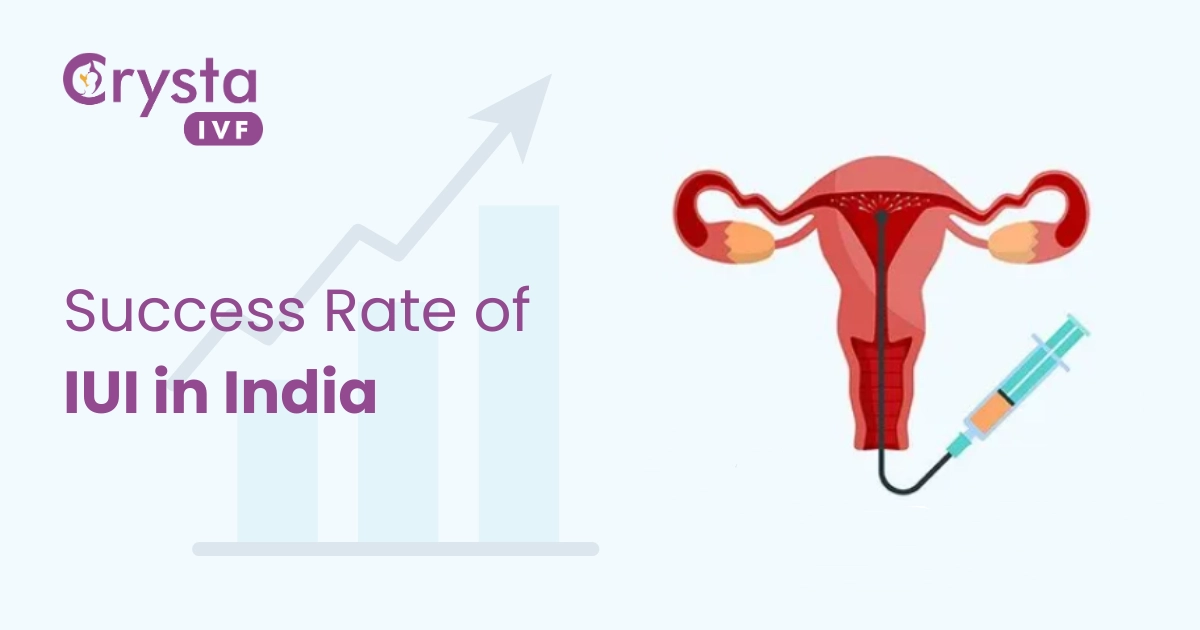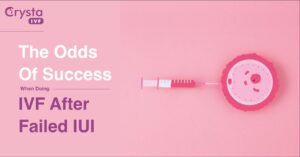As you embark on the pregnancy journey, especially when considering Intrauterine Insemination (IUI treatment), a popular method of Assisted Reproductive Technology, you may have numerous doubts. According to a recently published study, 27.5 million couples in India seek fertility treatments. Among these couples, Intrauterine Insemination IUI treatment emerges as a ray of hope for those nurturing their dream of parenthood. However, the path to fertility treatment is not an easy one. It entails numerous phases with many ups and downs, prompting one to consider the IUI success rate in India.
Alongside this consideration, it’s crucial to determine how to enhance your entire journey, overcome obstacles, and realize your dream of becoming a joyful parent. But before we delve further, let’s shed some light on the IUI treatment.
IUI Treatment: Navigating the path to parenthood
Intrauterine Insemination is a popular assisted reproductive technology procedure in which sperm is injected directly into a woman’s uterus.
When your ovaries produce one or more eggs to fertilize, the concentrated sperm is inserted directly into your uterus.
Doctors recommend IUI as a fertility treatment before suggesting other more intensive and expensive reproductive treatments.
IUI can be carried out with the sperm of your spouse or through a donor program. With less complication and common acceptance, IUI raises healthy pregnancy rates and ensures smooth delivery.
Who are the good candidates for IUI?
To increase the likelihood of successful IUI, it’s important not to have both fallopian tubes obstructed. These tubes serve as the conduit for transferring eggs to sperm. Therefore, at least one functional fallopian tube is necessary to ensure successful fertilization. Improving the chances of success also involves generating a higher-than-normal number of eggs. Moreover, certain conditions make you a suitable candidate for IUI treatment.
- Moderate endometriosis
- Undiagnosed Infertility
- Single mother
- Irregular ovulation
- Complications with cervical mucus ( stops sperm from reaching the egg)
- The inability of a male partner to get an erection
- Low sperm count
- Sperm Motility
After a thorough analysis, if you think you fit perfectly for the IUI treatment, it is time to understand the IUI process and determine the IUI treatment success rate to make the best decision regarding your treatment.
IUI Process: A step by step Guide
The standard IUI procedure accepted by most women are:
Ovulation period
To elevate your IUI treatment success rate, your healthcare provider will examine the exactness of your ovulation period with the help of a luteinizing hormone test. To ensure you produce an excess number of mature eggs, human chronic gonadotropin (hCG) injections, and other fertility drugs will be given to increase the number of produced matured eggs.
Preparing a sample of sperm
On the day of the IUI treatment, your spouse will provide a new sperm sample. However, donated sperm will get thawed before getting used. Following that, the ‘sperm washing’ technique will remove chemicals from the semen, enabling the insemination process to begin.
Artificial Insemination
In this step, your doctor will directly insert the sperm into your uterus. If the sperm and implants fertilize the egg into the uterine lining, pregnancy occurs. You can take a pregnancy test approximately two weeks after the IUI treatment.
What are some facts related to the success rate of IUI?
The general facts related to the success rate of IUI are:
IUI is a simple and affordable procedure compared to other reproductive treatments. While the success rate of IUI is generally high, it’s important to remember that individual bodies vary, and everyone is not guaranteed success. Numerous factors impact the success of IUI, including:
Age
The success rate of the IUI procedure is notably influenced by age. As you grow older, the likelihood of pregnancy decreases due to lower egg quality. For individuals under 35, the IUI success rate is approximately 13%, whereas it varies from 3 to 9% for those over 40.
Number of Follicles
Medication-assisted ovarian stimulation aims to enhance follicle growth, increasing the production of mature eggs and thereby boosting the chances of conception within the cycle. A higher number of follicles can positively influence pregnancy outcomes. Research also indicates that the formation of multiple follicles increases the likelihood of conception during IUI with controlled ovarian hyperstimulation. However, it’s important to know that an increased follicle number can also raise the potential for conceiving twins, triplets, or more.
Type of fertility drug used
In IUI cycles, fertility medications are synchronized to stimulate follicles for mature egg production. The type and dosage of medication often influence the IUI success rate. Additionally, your medical history, factors contributing to unexplained infertility, diagnosis, and personal preferences can also impact the recommendations provided by your fertility doctor.
Also Read – Cost of IUI in India
What is the success rate of IUI?
In the circumstances of an open fallopian tube, a good egg, and a healthy sperm count, you can expect an IUI success rate of around 7–10% per cycle. If fertility injections or drugs are used, your success rates might increase from 15% to 25%.
According to research, IUI has a 10% success rate in the first IUI cycle for couples under 35 years. The percentage can rise to 25% when the wannabe mother goes through hormone therapy.
Are there any factors that influence the IUI success rate?
Keys to a successful IUI depend on various factors, such as:
Sex after IUI: You may think it is necessary to have to undergo sex after IUI, but research has shown that having sex right after IUI can increase your chances of getting pregnant.
Healthy diet: The keys to a successful IUI also depend on your diet. Try to add more green vegetables to your diet and avoid processed and junk food to expect better results.
Less intense exercise: When undergoing infertility treatments like IUI, experts recommend selecting less intensive exercise methods such as walking, swimming, or yoga. However, be cautious not to engage in rigorous exercise routines, as they can significantly reduce your reproductive levels.
Quantity of sperm present in the semen: For a high IUI success rate, it is essential to have a high concentration of sperm in the sperm sample for the IUI procedure.
Stress: If you don’t promptly reduce and manage elevated stress levels, they can strongly impact your IUI treatment. Therefore, you can explore options like walking, meditation, or simple techniques to control your stress levels, such as breathing exercises to mitigate stress.
How can Crysta IVF help you improve your IUI success rate?
Intrauterine Insemination is a procedure that works to treat infertility. Mostly, it is used in male infertility cases. However, it is essential to note that IUI success rates can vary widely depending on various factors, such as the age of the individual undergoing treatment, the underlying fertility causes, the quality of eggs and sperm, and the IUI centre in Delhi where you are getting your treatment.
Working with an experienced panel of doctors, cutting-edge technology, ART labs, and modern equipment, Crysta IVF emerges on top when it comes to improving your IUI success rate. So, do not lose hope; make your parenthood dream a reality by booking an appointment with our fertility expert today!
FAQs
Suppose IUI is unsuccessful after a certain number of attempts. Your fertility specialist may explore alternative options, such as in vitro fertilization (IVF), or recommend further diagnostic tests to identify underlying issues.
IUI might be advised for couples dealing with mild male factor infertility, unexplained infertility, or ovulatory disorders. Your fertility specialist will assess whether IUI is suitable based on your circumstances.
No, the success rates of IUI can vary among clinics for various reasons, including differences in expertise and techniques. Choosing a reputable fertility clinic with a track record of successful outcomes is important.




